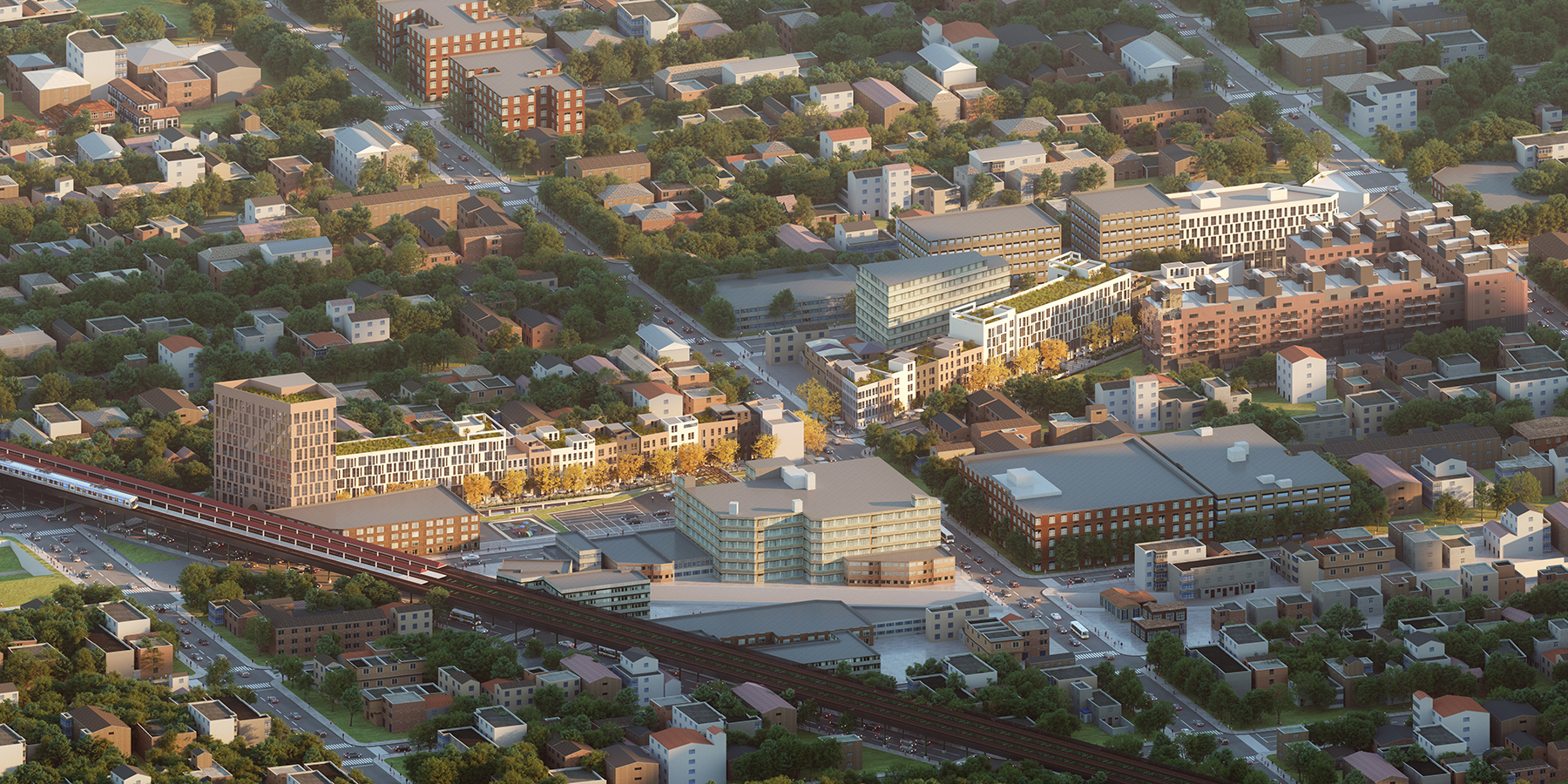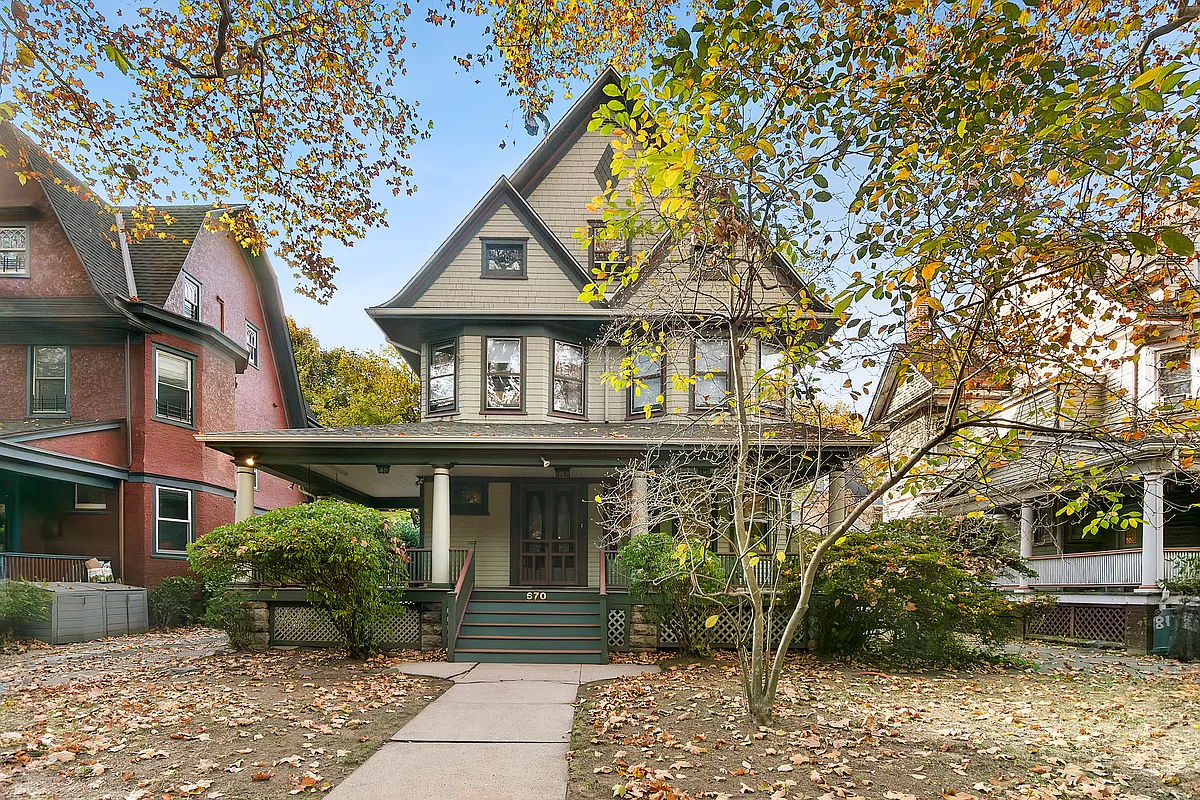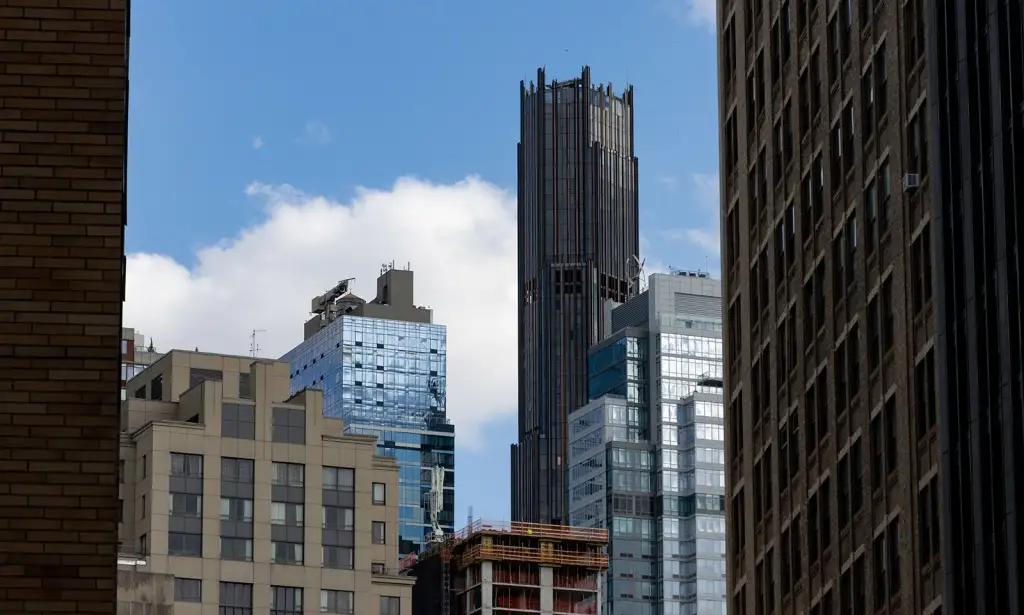John Catsimatidis: Tough Guy For Tough Times
John Catsimatidis: Self-made billionaire; owner of the Gristedes supermarket chain; developer of a planned, 660-unit project on Myrtle Avenue; potential mayoral candidate who says only he is tough enough to carry this city through the tough times ahead. In an interview with Brownstoner at his modest office in Hell’s Kitchen (not the trendy part), he…


John Catsimatidis: Self-made billionaire; owner of the Gristedes supermarket chain; developer of a planned, 660-unit project on Myrtle Avenue; potential mayoral candidate who says only he is tough enough to carry this city through the tough times ahead. In an interview with Brownstoner at his modest office in Hell’s Kitchen (not the trendy part), he describes a bleak future for Brooklyn and beyond. He’s not even positive the first phase of his Myrtle Avenue project is a “slam-dunk” because he hasn’t closed on the loan and “the banks are being a little more onerous than they used to be.” But Catsimatidis says the foundation was poured just in time for the 100 units to fall under the old 421-a rules that give him a tax breaks without providing any affordable units. Families United for Racial and Economic Equality (FUREE) just happens to be planning a protest outside his development site today, furious he reneged on his pledge to build 215 below-market apartments there. The group will also release a report on the displacement of residents and businesses as a result of the Downtown Brooklyn rezoning. Catsimatidis responds to our question about displacement: “There’s no displacement of residents that I know of. There’s no residential buildings that are really being torn down that I know of, and it’s just like I said, people have to stay where they are during a possible recession period.” We’ll find out in the coming months if he plans to officially throw his hat in the ring. Click through to read the interview, edited for length.
Brownstoner: You’ve eliminated the affordable housing component for your Myrtle Avenue project, which is [planned at] 660 units total. What do you think that means for other projects that would be seeking bonds?
It’s not true that we eliminated it forever. The first building we’re building, there’s not an affordable component. They didn’t have any municipal bonds to give us. For the affordable deal, they promised in the future that they think they’ll have some bonds available in 2009. So as we’re building, if we’re building, depending on the sanity of the real estate market in 2009, and if there are bonds available, and the bond market is open to buy these bonds, then we will consider building some affordable units in those buildings.
Looking forward today, the insanity going on in the mortgage market and what’s going on with Fannie Mae and Freddie Mac, they’re sold off 50 percent — I’m not terribly optimistic that the real estate market will come back next year. The building that we are building now, we wanted to continue to do something so it’s not just a vacant lot, and to provide essential services for the neighborhood like the Duane Reade that we’re contracted for. And the supermarket may be one of ours, it may not be one of ours. And one of the banks that were dealing with has agreed to provide a construction loan, which we haven’t closed on yet. But we did get the foundation in on time to meet the June 30 deadline for the 421-a tax abatement (under the old 421-a rules, developers could receive tax abatements without including affordable housing in their projects, unless they were building in certain Manhattan neighborhoods. As of June 30, the area where affordable housing is required has been greatly expanded, and includes Downtown Brooklyn).
Vince Tabone, Red Apple Group senior counsel: This project would not be viable but for the old 421-a. As it is, it’s only because of his economic wherewithal — he’s fronting the financing for the first phase while we’re negotiating with the bank so that we could have made that deadline.
You said you haven’t closed on the construction loan. Does that mean it’s not certain you’re going to move forward?
We’ve negotiated, and the banks are being a little more onerous than they used to be, but we feel it’s probably going to close. But it’s not a slam-dunk.
How much money in bond financing were you seeking per unit?
Lets call it 100 just to multiply it easily. 100 units, $25 million, it’s $250,000 per unit (total, or $1.25 million in bond financing per affordable unit that would have been created).
How do you think that the construction of all this new luxury or market-rate housing in Downtown Brooklyn impacts the lower- and middle-income residents?
First of all, market rate has a dual meaning. It is market rate as far as something you’re buying in Brooklyn. But it’s half price from Manhattan. So, I would almost consider it affordable- to middle-class housing at that market-rate. Even if we decided to sell them as condos, you’d be selling them at $600 [per square foot], $700 bucks maybe, versus Manhattan, which is anywhere from $1,200 to $1,500 a square foot. So, I would almost put it in the category of affordable, middle-class housing.
To people in Manhattan. But it’s not affordable to a lot of the people who are living in that neighborhood right now. Would you agree?
Then we might as well build nothing because we couldn’t build nothing. For whom do the bells toll? Think about it. I mean, should the taxpayers dish out money for affordable housing? Okay they’re willing to, but they ran out of the bonds.
So, you’re saying that without the subsidies housing can’t be built that is affordable to people living [in that neighborhood right now].
But then they’re already living there. If you want to bring in more people at those rates, then probably not. Where would you bring them in from, if they already have homes?
What about wages then? What could be done at the other end so more people could afford these houses?
Well, as of right now that’s not my department as far as wages … I worked at the Chamber of Commerce for 12 years at the West Side of Manhattan when the West Side of Manhattan was going through a revitalization. And the one thing I learned was, if business is doing well, people in the community are doing well. And if you want to kill businesses then people are not going to do well either, because there are not going to be the jobs.
Do you think prices are dropping because people have to put a higher percent down on their mortgage or because people are losing their jobs?
It’s a combination of both. I think a year ago, if we’re selling condominiums for $600,000, you go to the bank and borrow $550,000 and everybody would say, Okay, I’ll put $50,000 down on a down payment, my condo will be worth $800,000 a year from now,” and everybody has a good time. Now the banks are requiring the old-fashioned mortgages and not everybody has $120,000 to $140,000 for a down payment, so that’s one factor.
The other factor is, there’s a fear coming across Wall Street with the financial institutions, with the banks, Wachovia, all the investment bankers. There’s no deals being done. When there’s no deals being done, the next thing that happens after no deals is layoffs. That shoe has not dropped yet but the people working for these firms know that that shoe is about to drop because … that financial market is not going to turn around in 60 days.
So, is there a solution on the city level that can help ease us through this transition?
What’s going to happen is, people are going to [batten] down the hatches. And if you’re living in a rent-stabilized, rent-controlled apartment, you’re not necessarily going to decide to move to a larger apartment that might be market-rate right now.
For a while there was a lot of movement, and theoretically there will be more in the future. As the city continues to redevelop itself, do you think there’s something the city could be doing better to reduce the displacement of residents [and businesses] as it reshapes itself? Brooklyn in particular we’ll talk about.
There’s no displacement of residents that I know of [Downtown]. There’s no residential buildings that are really being torn down that I know of, and it’s just like I said, people have to stay where they are during a possible recession period
… When I grew up on 135th Street, my father was paying $48 a month rent. My father was a waiter and a bus boy. He wasn’t about to move into a $1,000 a month apartment just because he didn’t like living on 135th Street. I don’t know of any apartment buildings of great degree — maybe one, two, three, a small degree — that were torn down. And sometimes those people are paid large monies to displace themselves … But we’ve never torn down residential buildings.
… I went to Brooklyn Tech High School. I remember Dekalb Avenue, I remember Fort Greene Park was a combat zone. We never walked alone on those streets, we always had at least six guys with us. So, I remember those neighborhoods. I remember Myrtle Avenue when I first bought it 25 years ago.
Why did you buy it 25 years ago if it was a war zone?
It was a war zone. Because Long Island University was selling it. I looked at is as an opportunity to buy three city blocks for $400,000 or $500,000.
Now there’s a lot of new construction underway in Brooklyn, and of course across the city but again we’ll stick to Brooklyn. And the economy right now — the lending practices are tighter, the economy is beginning to sour. Do you think there are certain neighborhoods in danger of having a lot of uninhabited apartments, or half-built projects, or vacant lots where there was supposed to be something built, like in so many other cities across the country?
In Buffalo, I understand there’s 20,000 vacant homes.
Right. So, do you think that’s going to happen to places in Brooklyn?
Like I said, New York City is the greatest city in the world. And I think there’s a possibly of prices coming down to meet the needs of the people. And when the banks stop lending and I want to sell a house, there’s such a thing as seller financing. When the seller owns his house he can take a small down payment from the buyer and give him back a purchase-money mortgage (a loan provided by the seller as opposed to a bank, often given when the buyer is unqualified for a commercial mortgage).
And then in terms of jobs that would fill those buildings with people?
If you have less construction — and I think it was a terrible time for the city to have 421 go away — because if you have less construction, all those people who have been working construction jobs because the city’s been booming the last two, three years, you’re going to have a lot less work around.
Well, do you think that those construction workers are the people who are going to be filling these new apartments in Brooklyn?
Not necessarily.
When do you plan to formally announce you’re going to run for mayor, if you’re going to run for mayor?
We’re certainly looking at it very carefully and we’re thinking of forming an exploratory committee over the next month or two.
Did you change your party affiliation from Democrat to Republican already?
Yes.
And why did you do that?
Because I’m a moderate businessman. I believe business has to do well for people to do well. And a moderate businessman, the Democratic Party hasn’t nominated a moderate businessman in over 100 years … And I think when things are tough, you need somebody tough to manage the city.
What makes you tough?
40 years of surviving in business.









at the risk of my hamsters and myself, I have to say after going to the FUREE website that they are hardly the ravenous pack of wolves some people would have us believe. they organizer, true, but they are multi racial, have started education, leadership and voting programs and they are teaching women to be effective in the political and social arena. I don’t see anything in their website that says they are looking for handouts- in fact they got started in response to a workfare/education program that was seriously flawed and they wanted it to be better.
I really didn’t want to comment, but I’ve got to correct brine deez’s intentional or unintentional nonsense. The mortgage interest deduction is only taken by those who itemize their deductions. Recent figures suggests the deduction benefits relatively few homeowners (though NYC with its high home prices would be a prime candidate). But the idea that the amount of mortgage interest deduction even exceeds the amount spent on public housing and subsidies, let alone dwarfs it, is absolutely absurd.
Are you just using outrageous hyperbole to get your point across?
Jeez Louise put away the steely knives. Too much drama. Too much class warfare. People in this city of every race and creed manage to get along fairly well 99.8% of the time which is pretty remarkable. For all its failings we should not lose sight of that.
Look I only know what I read in the funny papers and the other day Fannie Mae and Freddie Mac almost went belly up along with Wall Street, the U.S. Real Estate Market and US Banking system. This guy Catsimatidis seems a bit to honest to be a politician so maybe you are right that he will never be Mayor but the day groups like FUREE (clearly an intentionally provocative miltant acronynm) can “protest” so that business people MUST fund items in the public interest is the day New York really does become Moscow on the Hudson. The politicians lining up with FUREE shoudl get back to work and expand the tax credit program instead of takingto teh streets. What are we France?
The reason that tax credits and tax abatements exist to subsidize affordable housing is because given the cost of NYC labor and compliance costs (DOB, DOT, and dozens of other alphabet soup agencies) no bank will finnace a project with low rent rolls. Low rent, High cost = no steel going up. From what I’ve read the guy has said that when credits become available and he can finance it he will do affordable units on the rest of the three blocks he owns. Seems fair to me. Just because he is a straight shooter and overweight is no reason he should have to capitulate to these clowns. If he did that I would say he does not have the right stuff to manage this “gorgeous mosaic” of a city.
“Montrose Morris: Affordable housing is by definition housing financed by the government. It seems you don’t believe in property rights and expect other people to give you the good life for free. Why don’t you go to the farmer and tell him to sell you grain and vegetables for a lower price? Or maybe even go to the bank and ask them to forgive your debt?”
Here’s one for you poly, “all” housing is financed by government. The value of the mortgage interest deduction enjoyed by so many hard working Americans dwarfs by magnitudes of hundreds of billions the amount spent on all public housing and subsidies. That doesn’t even account for public money used by developers. It’s such standard operating procedure that the $400 section 8 voucher is pilloried while billions of $$$ of middle and upper class housing subsidies are treated as matters of right and principal. I have no problem with the deduction per se, but I’m not going to relable it as something other than what it is – a handout.
You seem to have a selective interpretation of free market; farming and banking are fueled by federal, not private, largesse. From day one in our country we’ve had a mixed economy but for people like you apparently it’s myth busting to hear it.
As for your transparent incendiary for this discussion, about starting a fund to send people back to where you imagine they’re from. I guess there are some causes for which you’ll abandon your no handout principles, huh? Newsflash, folks who’ve been grinding for the poor and to be heard among the powerful have heard that one before. I wouldn’t keep my fingers crossed.
P:”Affordable housing is by definition housing financed by the government.”
Rubbish. Affordable housing can be built without subsidy, as evidenced by many places and organizations, including Habitat. What you’re really saying is that if Cast. can build luxury housing for twice the price, why should he not do so? Well, here’s one why.
Almost by definition, the ability to use your land is controlled by the public (ideally) in the form of zoning, tax subsidies, what have you. Property “rights” are assigned and are revocable (just ask Daniel Goldstein.)
Now it should be clear that building to diverse residential specs. is preferable than the mono-culture of the suburbs, for example. If you don’t think that affordable housing in Brooklyn or NYC in general is a good idea, you probably believe in living in one of the gated communities is a good thing, and should ignore this post.
Luxury housing pays for itself, and is the preferred style being built. So “affordable housing” (which in itself is a misnomer, since it caters to well above the middle class,) has to be built either 1) by a measure of coercion (zoning/planning) or 2) by subsidy. But in either event it’s just a payback for the rich getting all sorts of other hand-outs.
“Civilization is not defined by what people get, but how they behave.”
More rubbish, that’s civility. A decent provision for the poor is the true test of civilization (Johnson.) Obviously you are not in tune with civilization as we know it.
step in. just as John Catsimatidis said in the interview, he won’t build housing affordable to low and middle income brooklynites because it’s not profitable enough to make it worth his while. note the word “income.” that means these people are working.
i don’t see you suggesting that they get raises! you try looking for an apartment for your family in a safe neighborhood pretending you make $35G a year, which would qualify them for one of these below market units at below 60 percent median income. that’s what cops make to risk getting shot to protect you. don’t you know a lot of the people living in mitchell lamas work for the government? or are providing some service to you from the private sector? all these people are working for you! and only making enough to scrape by in this city. at least be somewhat grateful.
Most of the people living in subsidized housing have jobs, and they can’t afford market-rate housing because their jobs don’t pay enough. They don’t pay enough partly because the products and services produced by those jobs need to be kept affordable to the consumer, and in other part, so the shareholders, business owners, and high level excutives (i.e. people living in market rate housing here) recieve a greater level of profit/ pay.
Now if all these people you like to call low lifes were getting paid $100G, maybe they could afford unsubsidized housing, but then prices on everything would go up and your paycheck and/ or stock dividens would go down, therefore you wouldn’t be able to spend as much on both ends. And then you’d complain about that. You would say they don’t deserve to get paid $100G for bagging groceries or teaching schoolkids or taking your money at the cash register, or cleaning up the dirt left by your shoes after you walk down the hallway. But then you also say they don’t deserve to have the government step in and help create housing that is affordable to them so they can live in the city that they work. What exactly is the solution?
Don’t you see that the government is also helping to subsidize your high-end lifestyle? And union construction wages.
And I would also like to point out that it’s the developers asking for all these subsidies to create apartments that cost less than $600G. I’m sure that most low and middle income people would prefer not to have the stigma of living in housing that the government helped create, but the cost of housing is so expensive now, and there’s such a limit of decent, affordable housing on the market, that the government does have to
Polemicist- at least I have something dancing around in my skull. What’s the matter- too afraid to take on the what or were you too dense to get his german reference? You spout all manner of racist crap, you post wholly ignorant architectural information, and your social analysis is so primitive that I wonder if you even realize you are in 21st century America. You don’t even know the first rules of civilized behavior as well evidenced by your list. Yet you think I post drivel? Well, coming from a severely uneducated, racist and socially backward person such as yourself, I and my hamsters take “drivel” as a compliment. It’s a helluva a cut above anything you capable of posting.
Polemicist: Bravo. Bravo.